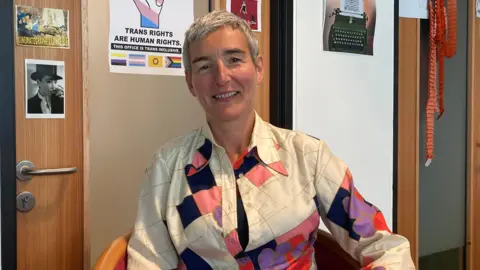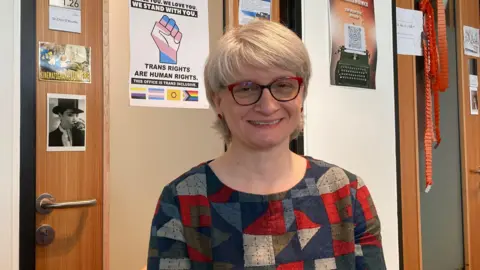'Death doesn't mean your sexual identity changes'
 BBC
BBCA new film project will share the stories of people in the LGBTQ+ community who are facing the end of their lives, with the aim of improving the support available to them.
The project, funded by the University of Warwick, is looking for participants to share their experiences.
The project lead, Prof Michele Aaron, said LGBTQ+ people were often reluctant to access end-of-life care and bereavement services because they feared discrimination.
"This project is all about harnessing the power of film to bring these really important stories into the world," she said.
Prof Aaron, who previously worked on another series of films about people affected by terminal illness, said there was a lack of films depicting the reality of death - even more so for LGBTQ+ people.
"Hollywood tells us it's painless; it's white; it's heroic; it's straight.
"And we don't have truthful, honest depictions of everyday LGBT experience in the world. We have sensationalist or exceptional stories.
"But what we're looking at is real-life stories."

The project is a collaboration between the university, queer film-maker El Jones, and the charity Compassionate Communities UK.
Support for those taking part will be provided by Helen Juffs, an end-of-life doula who offers spiritual and emotional guidance to those dealing with a terminal diagnosis, who herself identifies as queer.
She said people from the LGBTQ+ community were often reluctant to go into institutions such as hospices because of the need to come out to fellow patients or medical staff.
She described a gay woman in her 90s who was afraid well-meaning staff might pressure her to conform to feminine standards by offering to paint her nails or style her hair.
"Your identity doesn't change just because you're dying," she said. "You're still from that community and you still need to be respected and treated accordingly."
'Incredibly powerful'
Ms Juffs said LGBTQ+ people also risked being subject to so-called microaggressions.
"It might only be a tiny thing in somebody else's mind, like assuming that you've got a husband if you're a woman, assuming that the person who visits you all the time is your brother or sister because they're the same sex as you," she explained.
"It's the raft of microaggressions that really make life uncomfortable in institutions."
One of the participants is Trevor Yellon, a GP who struggled to find suitable bereavement support after losing his husband, Drew, to cancer in 2023.
"I needed someone who could understand why, as a gay man, some elements of my loss felt different and difficult - and I wasn't able to do that," said Dr Yellon.
"This project... will not only create awareness of the needs of LGBTQ+ communities at end-of-life and during bereavement, but also give insight into our real lives, our monogamous, committed long-term relationships, and our care, love and grief."
"It's incredibly powerful to share your story and have your voice heard," added Prof Aaron.
"But here specifically, the voice can then be heard by people who really need to hear it."
Follow BBC Coventry & Warwickshire on BBC Sounds, Facebook, X and Instagram.
